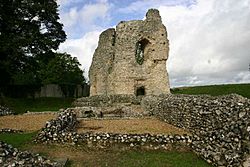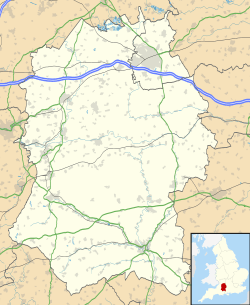Ludgershall Castle facts for kids
Quick facts for kids Ludgershall Castle |
|
|---|---|
| Ludgershall, Wiltshire, England | |

Remains of Ludgershall Castle
|
|
| Coordinates | 51°15′35″N 1°37′24″W / 51.2596°N 1.6233°W |
| Site information | |
| Owner | English Heritage |
| Open to the public |
Yes |
| Condition | Ruins and earthworks remain |
| Site history | |
| Materials | Stone |
Ludgershall Castle is a fascinating ruined castle in Ludgershall, Wiltshire, England. This historic site was once a strong royal home in the 12th century. Today, you can still see three large walls standing tall. The castle later became a hunting lodge for King Henry III. However, it was no longer used much by the 15th century. In 1981, this important ruin was officially protected as a Scheduled Ancient Monument.
Contents
Exploring Ludgershall Castle
Ludgershall Castle is more than just old walls. It has many interesting earthworks, which are changes made to the land. These earthworks show where different parts of the castle once stood. A private house now sits on a small part of the original site. Long ago, people also dug into the land here, changing some of the earthworks.
Ancient Beginnings
Historians believe the southern part of the castle site was once an Iron Age stronghold. This means people lived and defended themselves here thousands of years ago. It was a strong, protected place even before the castle was built.
Building the Medieval Castle
The first medieval castle was likely built in the late 11th century. This was around the 1000s. Edward of Salisbury, who was the Sheriff of Wiltshire, probably started its construction.
Royal Ownership and Changes
By about 1100, the castle belonged to the King. John the Marshal (who died in 1165) was in charge of the castle for the King. He made the castle stronger. John the Marshal might have added the northern part of the site. This area held important stone buildings, including a large hall and a tower. The tower had special rooms for the King and his family. The southern part of the castle was the bailey. This area had stables for horses, kitchens, and wooden farm buildings.
King John's Improvements
King John visited Ludgershall Castle in 1210. He made improvements to the castle, turning it into an even better hunting lodge. Kings often used these lodges when they went hunting in the nearby forests.
Ludgershall's Importance
In medieval times, Ludgershall was a more important town than it is today. It was even allowed to send two people to the Parliament. This was a special privilege. The town kept this right until the Reform Act of 1832 changed how Parliament worked.
Uncovering History
Between 1964 and 1972, experts from the University of Southampton dug up parts of the castle site. This was the first time such an excavation had happened there. These digs helped us learn much more about the castle's long history. In 1981, the castle ruins were officially listed as a Scheduled Ancient Monument. This means they are protected by law because of their historical importance.
 | Calvin Brent |
 | Walter T. Bailey |
 | Martha Cassell Thompson |
 | Alberta Jeannette Cassell |


